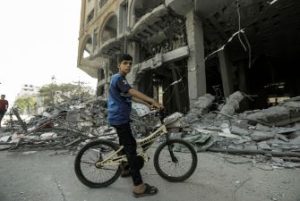Palestinians – the world’s forgotten refugees
Last month marked 75 years since the start of the Palestinian displacement crisis, which is the world’s longest protracted refugee situation.
There are currently 5.9 million registered Palestinian refugees across the Middle East. Many have no hope of obtaining citizenship in their host countries and are unable to be resettled.
Effectively, they will remain in limbo until there is a political resolution to the Israeli-Palestinian conflict.
Palestinians comprise the largest stateless community in the world. But recent crises in Afghanistan, Ukraine and elsewhere have seen their plight almost disappear into the background.
And intransigence on the part of successive Israeli governments to find a political accommodation has seen the situation dismissed as unsolvable.
The Palestinian population is unique among other refugee groups in many ways.
 Firstly, it includes people originally displaced from Palestine between 1946 and 1948, amid the creation of the state of Israel, as well as their children and other descendants.
Firstly, it includes people originally displaced from Palestine between 1946 and 1948, amid the creation of the state of Israel, as well as their children and other descendants.
While these younger generations would not typically be considered refugees in other displacement situations, they are counted as such by the United Nations Relief and Works Agency for Palestine Refugees (UNRWA).
While the Palestinian refugee population has grown significantly over time, it has done so because of the descendants of people displaced decades ago, rather than new displacement.
And unlike other refugees, Palestinians do not fall under the mandate of the UN High Commissioner for Refugees (UNHCR), but instead are protected by UNRWA, which was established in December 1949 to provide them direct relief and other services.
Unlike UNHCR, UNRWA cannot resettle refugees. Its mandate is described as providing assistance and protection to Palestinians “pending a just and lasting solution to their plight.”
UNRWA acts solely as a service provider, primarily for education, health – including mental health, social services, emergency assistance, and microfinance.
It does not administer the refugee camps where approximately one-third of all Palestinian refugees live, which are the responsibility of the host country or governing authority.
The seeds of Palestinian displaced were planted as a result of a plan formed after WWI by victor nations to foster a national home for Jewish people.
Under the Balfour Declaration, the UK – which administered Palestine after the fall of the Ottoman Empire – Jews were encouraged to settle in Palestine.
But they remained a minority until the 1930s when many fled Nazi persecution.
Palestinian Arabs revolted between 1936 until 1939, leading to about 10 per cent of adult male being killed, wounded, jailed or exiled.
WWII brought huge changes with the horrors committed by Nazis and their collaborators in the Holocaust creating a large displaced population and increasing pressure on Britain to lift restrictions on Jewish settlement in Palestine.
US President Harry Truman, under pressure from the growing American Jewish community, convinced Britain to resettle 100,000 refugees in Palestine.
The United Nations ‘Special Committee on Palestine’ proposed partitioning the territory into Jewish and Arab states, with the city of Jerusalem as a separate entity.
Despite their minority status, Jews were granted 55 percent of the mandate’s territory, including much of the productive agricultural land.
A civil war erupted following the partition vote with Arab and Jewish forces clashing in anticipation of British withdrawal.
Palestinian Arabs lacked the Zionists’ unity and resources and were reliant on an undersupplied Arab Liberation Army backed by regional states.
By the time Jewish leader David Ben-Gurion proclaimed the establishment of the state of Israel on May 14, 1948, more than 300,000 Palestinian Arabs had been turned into refugees.
More recently, Palestinian refugees have been negatively impacted by the capriciousness of US politics.
The US has historically been the largest donor to UNRWA, contributing between US$300-350 million a year.
But under the Trump administration aid fell to US $60 million in 2018 and was cancelled completely in 2019, before a restoration to US $338 million in 2020.
With the election of a Republican-controlled House of Representatives in 2022, UNRWA once again faces an uphill battle for funding, and agency staff fear that US financial support could stop altogether if a Republican retakes the presidency in 2024.
Donate to UNRWA here: Donate today | UNRWA












